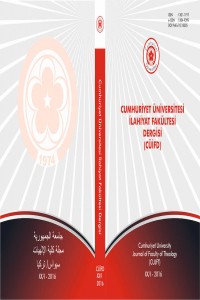Assessment OfThe Status Of Innovation In The Partition Of Joint Ownership In lslamic Fiqh Doctrine (The Sample Of Partnership And Joint Lands)
Öz
As well as being a legal issue, joint possession ownership causes
some problems by means of their right of disposal, so there exists
a constant tendeney of changing over to individual ownership for
each of partners of joint ownership. As a matter of fact the obligation
of using any right with intervention of anather person is unsuitable
by means of freedam and self-interest natures of human
being. Thus it is generally preferred to change over to individual
ownership system from joint ownership system unless there exists
any special reason necessitating the solidity of joint ownership.
The principles related to the techniques and procedures of this
change are investigated under the topics of portion/partition in
classical fiqh doctrine. Partition is a legal process which enables
terminating joint ownership and allowing permissive right of disposal
for each partner over his/her own stock. This process occurs
generally either by a decree or by any agreement between the
counterparties which occurs by comman accord. Terminating a
joint ownership occurs either by verbatim or by muhayye or in retum
for a charge.
The case of partition of joint ownership ta kes up a significant pas ition.
in many regions, there are serious problems on the partition
of innovation (major) right of joint ownership. The studies conveyed
in Islamic fiqh doctrine on the partition of joint ownership are
rather restricted. In this context, the situation of the right of innovation
(which belongs to major land/Superficies sola cedid) for
those lands those are subject to joint ownership and the regulations
of Islamic fiqh doctrine on this topic are always concerned
about. In this study it is aimed at conveying an ir;ıvestigation on
the situation of innovations on the partition of lahds which are
subject to joint ownership ( partnership or jointly).
Anahtar Kelimeler
Kaynakça
- ZEYDAN, Abdülkerim, el-Medhal li Diraseti'ş-Şeriati'l
- İslamiyye, Arnman 1990.
- ZEYLAİ, Abdullah b. Yusuf, Tebyinü'l-Hakak ala Kenzi'lDekail<,
- V, Beyrut trs.
- ZÜHA YLİ, Vehbe, el-Fıkhu'l-İsHimiyyü ve Edilletühü, Daru'lFikr,
- V, Dimeşk 1989.
- ZÜRKANİ, Muhammed b. Abdilibaki b. Yusuf, Şerhu'l Zürkani
- al'a Muvatta İmaın-ı Malik, VI, Beyrut 1990.
İSLAM FIKlH DOKTRİNİNDE MÜŞTEREK MÜLKiYETİN TAKSİMiNDE MUHDESATIN DURUMU (İŞTİRAK VE MÜŞTEREK ARAZİLER ÖRNEGİ)
Öz
Müşterek mülkiyet, hukuki bir durum olmakla birlikte bu tür mülkiyetlerin
tasarruf biçimlerinde problemler yaşandığından, müşterek
mülkiyet paydaşlarının her birinde, bireysel hak sahipliğine
geçiş yönünde sürekli bir eğilim bulunmaktadır. Zira bir hakkın,
başkasının katılımı ile kullanılması mecburiyeti insanın özgür tabiatına
ve ihtiraslarına uygun düşmemektedir. Bundan dolayı,
müşterek mülkiyetın sürekliliğini gerekli kılan özel bir sebep yoksa
genellikle müşterek hak sahipliği rejiminden bireysel hak sahipliği
rejimine geçiş tercih edilmektedir. Bu geçişin teknik ve usulüyle ilgili
temel kurallar, klasik fıkıh doktrininde kısmet 1 taksim başlığı
altında ele alınmıştır. Taksim, müşterek mülkiyetın sona erdirilmesi
ve paydaşlardan her birinin kendi hissesi üzerinde bağımsız
olarak dilediği şekilde tasarruf etmesi amacına yönelik hukuki bir
işlemdir. Bu taksim işlemi, genellikle ya mahkeme kararı 1 kazai
olarak hükmen ya da taraflar arası rızaen 1 anlaşmayla gerçekle-
şir. Müşterek mülkiyetın saniandıniması ise ya "aynen" ya
"muhayee"ya da"bedel" karşılığında olur.
Ülkemizde müşterek mülkiyetın taksimi konusu önemli bir yer iş
gal etmektedir. Pek çok bölgede müşterek mülkiyetın muhdesat
(üst) hakkının taksimi konusunda ciddi problemler yaşanmaktadır.
İslam fıkıh doktrininde müşterek mülkiyetin taksimi konusunda
yapılan çalışmalar da oldukça sınırlıdır. Müşterek mülkiyete konu
olan arazilerin taksiminde muhdesat (üst araziye ait olur) hakkının
durumuyla ilgili İslam fıkıh doktrininde yapılan düzenlernelerin neler olduğu hep merak konusu olmuştur. Bu nedenle "müşterek
mülkiyet" kapsamındaki (iştirak veya müşterek) arazilerin taksimi
ve muhdesatlarının durumu ile ilgili bir çalışma yapılması hedeflenmiştir.
Kaynakça
- ZEYDAN, Abdülkerim, el-Medhal li Diraseti'ş-Şeriati'l
- İslamiyye, Arnman 1990.
- ZEYLAİ, Abdullah b. Yusuf, Tebyinü'l-Hakak ala Kenzi'lDekail<,
- V, Beyrut trs.
- ZÜHA YLİ, Vehbe, el-Fıkhu'l-İsHimiyyü ve Edilletühü, Daru'lFikr,
- V, Dimeşk 1989.
- ZÜRKANİ, Muhammed b. Abdilibaki b. Yusuf, Şerhu'l Zürkani
- al'a Muvatta İmaın-ı Malik, VI, Beyrut 1990.
Ayrıntılar
| Bölüm | Araştırma Makalesi |
|---|---|
| Yazarlar | |
| Yayımlanma Tarihi | 15 Aralık 2012 |
| Yayımlandığı Sayı | Yıl 2012 Cilt: 16 Sayı: 2 |
CUIFD Creative Commons Atıf-Gayriticari-Türetilemez 4.0 Uluslararası Lisansı ile lisanslanmıştır.

